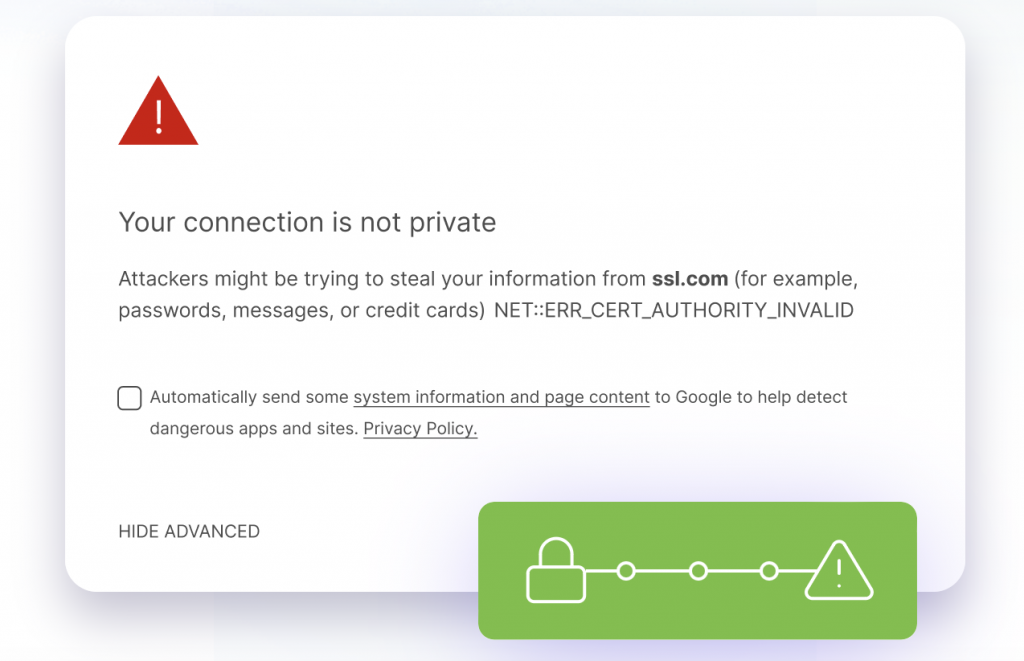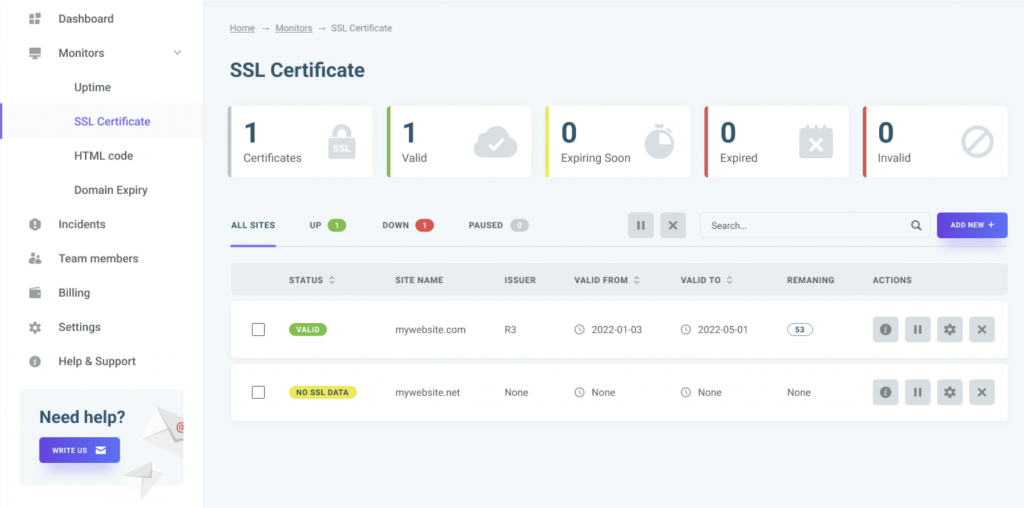In today’s digital era, where online transactions and data exchanges are commonplace, ensuring website security is crucial. A critical component of website security is the SSL (Secure Sockets Layer) certificate. Explore SSL certificates, their significance, and how they secure your website.
- What is an SSL Certificate?
- How SSL Certificates Work
- Types of SSL Certificates
- Why SSL Certificates are Important
- Building Trust with Users
- Boosting SEO Rankings
- How SSL Certificates Protect Your Website
- Authenticating Your Website’s Identity
- Preventing Man-in-the-Middle Attacks
- Ensuring Compliance with Regulations
- The Role of SSL Certificate Monitoring
- Importance of Monitoring SSL Certificates
- Common Issues Detected by SSL Monitoring
- Benefits of SSL Certificate Monitoring with PingWeb
- Real-Time Alerts for Potential Issues
- Simplifying Certificate Management
- Compliance and Assurance
- Conclusion
What is an SSL Certificate?

An SSL certificate is a digital certificate that authenticates a website’s identity and enables an encrypted connection. It’s akin to sealing a letter in an envelope before sending it through the mail. SSL certificates ensure that data transferred between users and websites remains private and integral.
SSL certificates are essential for any website that handles sensitive information, such as credit card details, personal identification numbers, or login credentials. Without SSL, this data can be intercepted by malicious actors, leading to data breaches and identity theft. The primary purpose of an SSL certificate is to establish a secure, encrypted connection between a web server and a browser, ensuring that all data passed between the two remains private and secure.
How SSL Certificates Work
SSL certificates work by utilizing a cryptographic protocol that provides secure communication over a computer network. When a web browser attempts to access a website, the SSL certificate enables an encrypted connection. This process, known as the SSL handshake, involves the following steps:
- Browser to Server: The browser connects to the server and requests identification.
- Server Response: The server sends a copy of its SSL certificate.
- Certificate Validation: The browser checks the certificate’s authenticity.
- Encryption Initiation: The browser and server initiate an encrypted session.
The SSL handshake is a complex process that ensures the authenticity and integrity of the data being transferred. During this process, the server and browser agree on encryption algorithms, exchange keys, and establish a secure connection. This handshake happens within milliseconds, making it invisible to users while providing a secure browsing experience.
Types of SSL Certificates
- Domain Validation (DV) Certificates: Basic level of validation, verifying the owner’s control over the domain.
- Organization Validation (OV) Certificates: Include additional validation steps, verifying the organization’s existence and identity.
- Extended Validation (EV) Certificates: Offer the highest level of validation, providing a green address bar or company name in the browser, indicating a highly secure site.
Each type of SSL certificate serves a different purpose and offers varying levels of security and validation. DV certificates are suitable for personal websites or blogs, while OV certificates are ideal for businesses that need to establish trust with their customers. EV certificates are used by financial institutions and e-commerce sites that require the highest level of trust and security.
Why SSL Certificates are Important

SSL certificates encrypt data transferred between the server and the client, ensuring that sensitive information such as login credentials, personal details, and payment information remain confidential. This encryption makes it nearly impossible for cybercriminals to intercept and read the data, protecting users from identity theft and fraud.
The encryption provided by SSL certificates uses complex algorithms to scramble the data, making it unreadable to anyone without the decryption key. This ensures that even if the data is intercepted, it cannot be understood or used maliciously. SSL encryption is essential for maintaining the privacy and integrity of data, especially when handling sensitive information.
Building Trust with Users
Websites with SSL certificates display a padlock symbol in the address bar, signaling to users that the site is secure. This visual cue helps build trust and confidence, encouraging users to interact with the website. Trust is a crucial factor in online transactions, and SSL certificates play a significant role in establishing it.
In addition to the padlock symbol, EV certificates provide a green address bar or company name, further enhancing trust. Users are more likely to engage with and make purchases from websites that display these security indicators. SSL certificates reassure users that their data is being handled securely, fostering trust and loyalty.
Boosting SEO Rankings
Google and other search engines prioritize secure websites in their search results. Websites with SSL certificates are favored in rankings, potentially increasing traffic and visibility. Implementing SSL can improve a website’s SEO performance, driving more organic traffic and enhancing online presence.
Search engines prioritize user experience and security, and SSL certificates contribute to both. By securing your website with SSL, you not only protect your users but also enhance your site’s credibility and search engine ranking. This can lead to higher visibility, increased traffic, and ultimately, more conversions.
How SSL Certificates Protect Your Website
SSL certificates encrypt data, making it unreadable to unauthorized parties. This encryption protects sensitive information such as passwords, credit card numbers, and personal details from cybercriminals. Encryption ensures that even if data is intercepted, it cannot be understood or used maliciously.
The encryption process involves converting plain text into ciphertext using complex algorithms. Only the intended recipient with the correct decryption key can convert the ciphertext back into readable text. This process ensures that data remains confidential and secure during transmission, protecting users from data breaches and cyberattacks.
Authenticating Your Website’s Identity
SSL certificates verify that a website is legitimate and that users are connecting to the intended server. This authentication helps prevent phishing attacks and assures users of the site’s authenticity. Phishing attacks involve malicious actors creating fake websites to steal user information, but SSL certificates help mitigate this risk.
When a user connects to a website with an SSL certificate, the browser checks the certificate’s validity and authenticity. If the certificate is valid, the browser establishes a secure connection, ensuring that the user is interacting with the legitimate website. This process helps prevent phishing attacks and builds user trust.
Preventing Man-in-the-Middle Attacks
SSL certificates protect against man-in-the-middle attacks, where a malicious actor intercepts communication between the user and the website. The encrypted connection ensures that data cannot be tampered with or intercepted. Man-in-the-middle attacks can lead to data breaches and identity theft, but SSL certificates provide a robust defense.
During a man-in-the-middle attack, the attacker intercepts the communication between the user and the server, potentially altering or stealing the data. SSL certificates encrypt the data, making it unreadable to the attacker. This encryption ensures that even if the data is intercepted, it cannot be tampered with or understood, protecting users from cyber threats.
Ensuring Compliance with Regulations
Many regulations, such as GDPR and PCI DSS, require websites to implement adequate security measures, including SSL certificates. Compliance with these regulations is crucial to avoid penalties and protect user data. SSL certificates help websites meet regulatory requirements and maintain a secure online environment.
Regulations such as GDPR and PCI DSS mandate strict security measures to protect user data. SSL certificates are a key component of these measures, ensuring that data is transmitted securely and protected from unauthorized access. Compliance with these regulations is essential for maintaining user trust and avoiding legal penalties.
The Role of SSL Certificate Monitoring
SSL certificate monitoring is the process of continuously checking the status and validity of SSL certificates. This monitoring ensures that certificates are always up-to-date and functioning correctly. Regular monitoring helps prevent security breaches and ensures that websites remain secure and trustworthy.
SSL certificate monitoring involves regularly checking the expiration dates, configuration settings, and overall health of SSL certificates. Automated monitoring tools can detect issues such as expired certificates or misconfigurations and alert administrators to take corrective action. This proactive approach ensures that SSL certificates are always in good standing and functioning properly.
Importance of Monitoring SSL Certificates
Regular monitoring of SSL certificates is essential to avoid potential security breaches and downtime. Expired or misconfigured certificates can lead to broken trust, security vulnerabilities, and loss of business. Monitoring helps identify and resolve issues before they impact users or compromise security.
SSL certificates have a finite validity period and need to be renewed periodically. Monitoring ensures that administrators are alerted well in advance of expiration dates, allowing them to renew certificates on time. Additionally, monitoring can detect misconfigurations or vulnerabilities, ensuring that SSL certificates provide the highest level of security.
Common Issues Detected by SSL Monitoring
- Expired Certificates: SSL monitoring alerts you when a certificate is nearing its expiration date.
- Configuration Errors: Monitoring identifies misconfigurations that could compromise security.
- Vulnerabilities: Alerts for known vulnerabilities in SSL/TLS protocols that need addressing.
SSL certificate monitoring tools can detect a range of issues that may affect the security and functionality of SSL certificates. Expired certificates can lead to broken trust and security vulnerabilities, while misconfigurations can compromise the encryption process. Monitoring tools provide real-time alerts for these issues, allowing administrators to take prompt action and maintain a secure website.
Benefits of SSL Certificate Monitoring with PingWeb
PingWeb offers comprehensive SSL certificate monitoring services that provide real-time alerts for potential issues. Our platform continuously checks the status and configuration of your SSL certificates to ensure they are always valid and secure. PingWeb’s monitoring tools are designed to provide maximum security and peace of mind.
PingWeb’s SSL certificate monitoring service includes regular checks of expiration dates, configuration settings, and overall certificate health. The platform provides real-time alerts for any detected issues, allowing administrators to take immediate action. This proactive approach ensures that SSL certificates are always in good standing and functioning correctly.
Real-Time Alerts for Potential Issues
PingWeb sends instant notifications for any detected issues, such as impending certificate expiration or configuration errors. These alerts allow you to take immediate action, preventing potential downtime and security risks. Real-time alerts ensure that administrators are always aware of the status of their SSL certificates.
Real-time alerts are crucial for maintaining a secure website. PingWeb’s monitoring tools provide instant notifications for issues such as expired certificates, misconfigurations, or vulnerabilities. These alerts allow administrators to take prompt action, ensuring that SSL certificates are always valid and secure.
Simplifying Certificate Management
PingWeb simplifies SSL certificate management by providing a centralized platform for monitoring and maintaining certificates. Administrators can view the status of all SSL certificates in one place, making it easy to identify and resolve issues. PingWeb’s intuitive dashboard offers detailed insights into certificate health, expiration dates, and historical data.
Compliance and Assurance
Maintaining SSL certificate compliance is essential for meeting regulatory requirements and ensuring user trust. PingWeb helps organizations stay compliant by monitoring SSL certificates for adherence to industry standards and best practices. Our platform provides reports and analytics to support compliance efforts and demonstrate due diligence.
Conclusion
In conclusion, SSL certificates are vital for protecting your website and securing sensitive data. They encrypt information, verify website authenticity, and build trust with users. SSL certificate monitoring enhances security by ensuring certificates are always up-to-date and functioning correctly. PingWeb’s SSL certificate monitoring services offer real-time alerts, simplified management, and compliance assurance, making it easier than ever to maintain a secure online presence.
Whether you’re a small business or a large enterprise, safeguarding your website with SSL certificates and monitoring is essential. By prioritizing security and compliance, you can protect your users, uphold your reputation, and mitigate risks associated with cyber threats. Invest in SSL certificate monitoring with PingWeb to safeguard your digital assets and maintain trust with your audience.
Discover the importance of SSL certificates and how they protect your website. Start monitoring your SSL certificate with PingWeb today – try our 14-day free trial!


